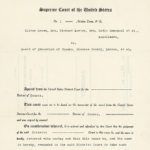This lesson has students explore the challenges that incoming administrations face during presidential transitions. Students will hear from historians and from White House staff to learn about previous presidential transitions and how the administrations worked together. With this information, students will develop a list of best practices that can be used during these transitions.
NHD Breaking Barriers: Americans and Native Americans
From the colonial era, relations between European settlers and Native American nations have been complicated. In 1803 Congress authorized and funded an expedition led by Meriwether Lewis and William Clark for exploration of the region and for better knowledge about American Indians of the Northwest in order to develop trade. About 30 years later, the United States forced the removal of Native Americans from their lands to make way for white American settlement. Congress and the president made treaties with Native American nations, but those treaties were not always respected as the United States continued to expand into the west. After Native Americans enlisted and served in both World War I and World War II, Congress passed legislation to begin to address longstanding Native Americans claims against the United States Government.
Too Many Candidates vs. Too Few
Explore the role of third-party candidates and how the American political system makes it very difficult for anyone outside the Republican or Democratic Party to win the White House. Registration is required to view this resource.
Brown v. Board of Education Lesson Collection

On May 17, 1954 the Brown v. Board of Education decision was made. This landmark Supreme Court decision declared that laws establishing separate public schools for black and white children were unconstitutional. The Brown v. Board of Education ruling overturned the Plessy v. Ferguson decision of 1896, which allowed state-sponsored segregation in public schools. To support teachers as they commemorate this important anniversary in their classes, the Share My Lesson team has selected a variety of free lesson plans, educational resources and classroom materials about equity, particularly in schools.
Different Treatment for Different Folks
The lesson begins with an illustration of the “separate but equal” doctrine – two water fountains are depicted, one labeled “colored” and the other labeled “white”. Students will discuss how this doctrine was used to justify separate treatment based on race, and that such a policy would not be legal today.
Win the White House (Game and Teacher Guide)
In Win the White House, your students take on the role of presidential candidate from the primary season all the way through to the general election. The player strategically manages time and resources to gain control of as many electoral votes as possible over a ten-week campaign. This can only be done by effectively communicating his or her position on issues, and mastering media and public appearances.
Indian Boarding Schools Primary Source Set
Through photographs, letters, reports, interviews, and other primary documents, students explore the forced acculturation of American Indians through government-run boarding schools.
Iroquois Council: Choosing Sides
In this simulation, elementary or middle school students convene as an Iroquois council in upstate New York, 1777. British agents are trying to convince Iroquois nations to take their side in the Revolutionary War.
Election: The Road to the White House (Secondary)
During an election, civic energy reaches a fever pitch. The vote is one of the citizen’s most powerful tools, and advocating for a candidate, a set of ideas, or a platform is the right of every citizen. The President of the United States is often called the most powerful person in the world, so with every presidential election, the stakes are high. This unit is designed to teach students about presidential elections. It is not a collection of facts, diagrams, and explanations of processes. It is an interactive, project-based unit that invites the student to fully engage in the process of an election while also informing students about how elections work. It is our hope that this unit helps cultivate the sorts of informed and engaged citizens that are so essential to our democracy.
Election: The Road to the White House (Elementary)
This unit is designed to teach students about presidential elections. It is not a collection of facts, diagrams, and explanations of processes. It is an interactive, project-based unit that invites the student to fully engage in the process of an election while also informing students about how elections work. It is our hope that this unit helps cultivate the sorts of informed and engaged citizens that are so essential to our democracy.